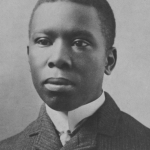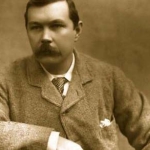Indicative of the passion of the people
on the 15th of April, 1865
on the 15th of April, 1865
Good Friday was the day
Of the prodigy and crime,
When they killed him in his pity,
When they killed him in his prime
Of clemency and calm—
When with yearning he was filled
To redeem the evil-willed,
And, though conqueror, be kind;
But they killed him in his kindness,
In their madness and their blindness,
And they killed him from behind.
There is sobbing of the strong,
And a pall upon the land;
But the People in their weeping
Bare the iron hand:
Beware the People weeping
When they bare the iron hand.
He lieth in his blood—
The father in his face;
They have killed him, the Forgiver—
The Avenger takes his place,
The Avenger wisely stern,
Who in righteousness shall do
What heavens call him to,
And the parricides remand;
For they killed him in his kindness,
In their madness and their blindness.
And his blood is on their hand.
There is sobbing of the strong,
And a pall upon the land;
But the People in their weeping
Bare the iron hand:
Beware the People weeping
When they bare the iron hand.




















Comment form: